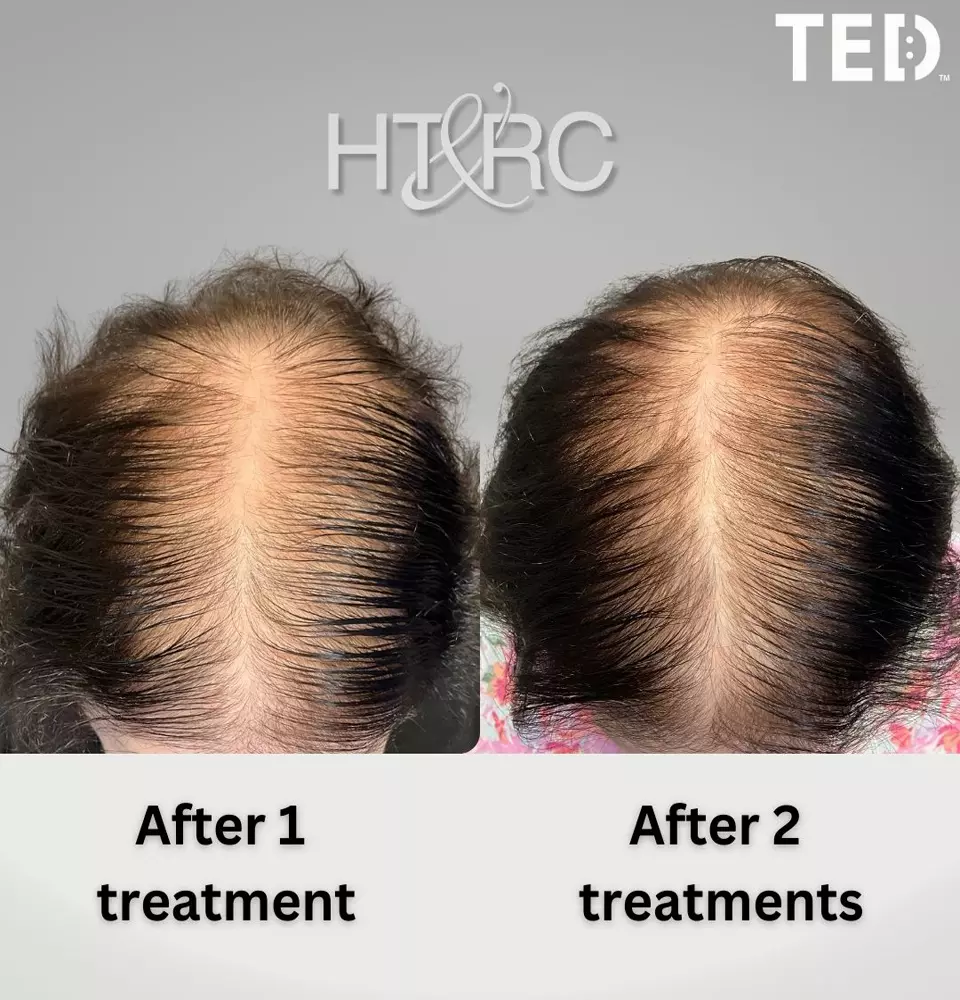Obesity is a widespread issue that affects millions of people worldwide. While various options are available for weight loss, Semaglutide (also Tirzepatide) and bariatric surgery are two popular approaches that have shown significant results. However, both methods are known to cause hair loss as a potential side effect. In this article, we will discuss Semaglutide, bariatric surgery, the potential side effects of hair loss associated with both, and the needle-free Alma TED treatment we offer designed to combat shedding.
Semaglutide
Semaglutide was developed in the early 2000s with a focus on diabetes care. The medication was initially studied, designed, and approved for its potential to improve glycemic control in people with type 2 diabetes. Clinical trials demonstrated the medication's ability to lower blood sugar levels and, in some cases, promote weight loss. Semaglutide was further studied and approved in 2021 as a treatment for chronic weight management in adults with obesity or overweight individuals with at least one weight-related comorbidity.
Semaglutide mimics the action of glucagon-like peptide-1 (GLP-1). Glucagon-like peptide 1 is a hormone produced in the gut and released in response to food. It causes insulin release, helps regulate blood sugar levels, and reduces appetite and food intake. In weight management, semaglutide interacts with GLP-1 receptors in the brain, recreating the same feeling released after eating - fullness (satiety) and lessening the desire to eat. It also slows down the rate that food moves from the stomach to the intestines, also adding to the feeling of fullness.
Semaglutide is available in different formulations, including a weekly subcutaneous injection; brand names include Wegovy and Ozempic. Additionally, an oral formulation, Rybelsus, was developed to provide a non-injectable option for individuals with type 2 diabetes. The duration of treatment for weight management can vary based on individual response, weight loss goals, and the guidance of your doctor.
Similarly, Tirzepatide, brand name Mounjaro and Zepbound, is another popular weight loss medication that mimics the GLP-1 and GIP hormones naturally secreted by the intestine after a meal, prompting insulin secretion. It also reduces appetite by slowing down the time it takes the stomach to empty and interacting with areas in the brain harboring GLP-1 receptors to signal satiety.
Treatment with all medications can continue for as long as it is deemed beneficial. Research into the potential applications of weight loss drugs continues, with ongoing studies exploring its effects on various aspects of metabolic health, including cardiovascular outcomes, kidney function, and other areas of interest.
Bariatric Surgery
Bariatric surgery, also known as weight loss surgery, encompasses a variety of procedures performed on individuals who are obese. These surgical interventions are designed to help patients lose weight by altering the digestive system, thereby promoting weight loss and potentially improving obesity-related health conditions. Bariatric surgery can lead to significant weight loss in the months and years following the procedure.
Bariatric surgery can be traced back to the 1950s when surgeons began to experiment with different techniques to help severely obese patients lose weight. Since then, it has developed and gained increased recognition, from experimental and often risky surgeries to safer and more effective treatments for severe obesity and related comorbidities. There are several types of bariatric surgery, each with its own mechanisms of action, and are often chosen based on a patient's individual needs and health considerations. Advances in surgical approaches, improved patient selection, and postoperative care have contributed to better outcomes and reduced risks.
The number of times a person can undergo surgery depends on several factors, but in some cases, individuals may require revisional bariatric surgery. However, bariatric surgery is not without risks and requires significant lifestyle changes, including dietary modifications and regular physical activity, to achieve long-term success. While some individuals experience sustained weight loss over the long term, some degree of weight regain is possible.
Telogen Effluvium
Consequently, rapid weight loss from methods just discussed can be associated with a phenomenon known as telogen effluvium. Telogen effluvium is a form of temporary hair loss that occurs when a large number of hair follicles simultaneously enter the telogen (resting) phase of the hair growth cycle, leading to excessive shedding. This condition is typically characterized by a sudden, widespread thinning of the hair rather than specific bald patches.
Telogen effluvium is a reactive process that several events, including physical or emotional stress, major surgery, childbirth, high fever, severe infection, chronic illness, certain medications, hormonal changes, nutritional deficiencies, and significant weight loss, can trigger.
Following the trigger, hair shedding typically becomes noticeable about two to four months later. This delay is due to the time it takes for affected hair follicles to transition from the anagen phase to the telogen phase.
Weight Loss and Telogen Effluvium
Several characteristics associated with rapid weight loss methods will trigger telogen effluvium or shedding:
- Nutritional Deficiencies: When individuals engage in rapid weight loss through extreme caloric restriction or highly restrictive diets, they may not consume adequate amounts of essential nutrients, such as protein, iron, zinc, and specific vitamins. These nutrients are vital for healthy hair growth, and their deficiency can disrupt the normal hair growth cycle, leading to increased shedding.
- Stress on the Body: Rapid weight loss places significant stress on the body, both physically and metabolically. This stress can disrupt the normal functioning of various bodily systems, including those involved in maintaining healthy hair growth.
- Hormonal Changes: Significant changes in body weight and composition can lead to fluctuations in hormone levels. Hormones play a crucial role in regulating the hair growth cycle, and imbalances or changes in hormone levels can contribute to hair shedding.
- Caloric Restriction: Severe caloric restriction can lead to a decrease in energy availability, which may affect the hair growth cycle. This reduction in energy availability can influence the body's prioritization of essential functions, potentially impacting hair growth.
How long does shedding last?
Typically, the shedding phase can last several months with telogen effluvium before the hair growth cycle returns to normal. Once the underlying trigger is resolved, the condition often improves, and the hair growth cycle returns to normal within six to nine months. If shedding continues, it would be known as chronic telogen effluvium.
Bariatric surgery has a well-documented history, and as a result, we know the potential side effect of hair loss is a recognized associated phenomenon due to the body's adjustment to a large amount of rapid weight loss and possible changes in nutrient absorption and typically occurs within the first six months to a year after surgery; in most cases, the hair loss can stop at six months to a year, but some patients continue to shed for an undefined period of time.
However, as semaglutide (and Tirzepatide) is a relatively new drug, its full range of potential side effects, including hair loss, is still being comprehensively studied and understood. Since this is not a "one-time" event but an ongoing treatment your doctor administers, your body is continually operating at a caloric deficit (potentially long-term). In answer to the question, the extent and duration of shedding from these weight loss drugs remains uncertain. The medications have not been around long enough for extensive studies. We can only guess at this point and continue to treat.
Treatment and Outlook
Even though there are unknowns with shedding from weight loss, the good news is that you don’t have to wait to seek treatment. Whether you want to get “ahead” of it, recently started, or have been shedding for several months - we recently introduced a needless treatment for shedding - the first of its kind in Middle Georgia. Dr. Gray believes this new treatment, Alma TED, is the most potent for shedding out of all treatment options, and he remains very optimistic that this will be a game changer for all patients experiencing hair loss.

Alma TED (Trans Epidermal Delivery) is a relatively recent technology using acoustic sound waves and air pressure to deliver active ingredients directly into the skin's dermal layer, where they can have a more targeted and effective impact. Providing needle-free and pain-free hair restoration, no surgery needed.
Alma Ted treatments involve the application of specialized serums or solutions containing ingredients intended to nourish the scalp, strengthen hair follicles, and support healthy hair growth. These active ingredients can penetrate the skin barrier more effectively using the needless Alma TED technology, potentially enhancing their efficacy compared to traditional topical applications.
The specific ways in which Alma TED treatments may help with hair shedding include:
- Enhanced Absorption: Alma TED technology facilitates the deep penetration of active ingredients into the scalp, allowing for better absorption and utilization of beneficial compounds by the hair follicles and surrounding tissues.
- Scalp Nourishment: The targeted delivery of nourishing and revitalizing substances, such as vitamins, minerals, peptides, and growth factors, help to improve the overall health of the scalp, providing an optimal environment for hair growth and minimizing factors that contribute to shedding.
- Hair Follicle Stimulation: Certain ingredients delivered through Alma TED treatments have properties that help stimulate hair follicles, promoting healthier and more robust hair growth while potentially reducing the impact of shedding.
It's important to note that while Alma TED treatments may offer potential benefits for addressing hair shedding, individual responses to these treatments can vary. Additionally, the efficacy of such treatments can depend on various factors, and incorporating an additional therapy, such as a nutritional supplement, might also be beneficial.
As with any hair or scalp treatment, it's essential to approach potential solutions with a comprehensive understanding of one's unique circumstances and to seek guidance from qualified professionals to ensure safe and effective care. If you are experiencing shedding - you are not alone. Schedule a consultation with Dr. Gray to discuss your treatment options.







